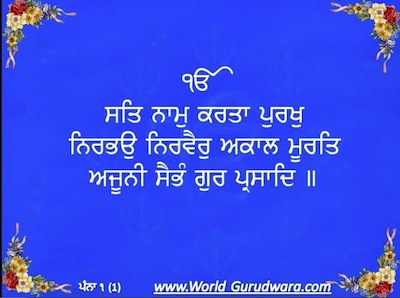
Japji Sahib ji
Guru Nanak Dev Ji’s Mool Mantra followed by 38 hymns and a final Salok is at the very beginning of the Guru Granth Sahib. It is regarded as the most important Bani or ‘set of verses’ and is recited every morning by all practicing Sikhism.

Jaap Sahib ji
Jaap Sahib was composed by Sri Guru Gobind Singh ji. The Jaap Sahib is the first Bani in the Dasam Granth, which is said to have been compiled by Bhai Mani Singh around the year 1734.

Tav Prasad Savaiye
This is a short hymn of 10 stanzas. It is a part of Guru Gobind Singh’s composition Akal Ustat (The praise of God). This Bani appears in the Dasam Granth on pages 13 to 15.
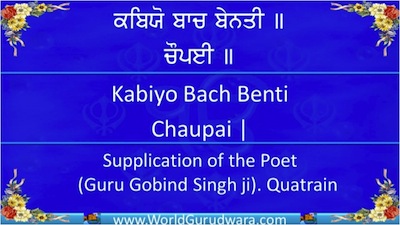
Chaupai Sahib ji
Chaupai is the 405th Chittar of the Charitropakhyan of the Dasam Granth by Guru Gobind Singh ji. Sikhs recite this Bani to gain spiritual safety and defense from external and internal enemies, worries and afflictions. The Gurmukhi gives one self-confidence and an upbeat feeling. This Bani gives one the feeling of reliability and dependability on Wahe Guru Ji.

Anand Sahib ji
The word Anand means complete happiness and it is said that the person reciting this Bani in the morning with dedication, attention, and comprehension can achieve happiness and peace of mind. The Anand Sahib is written by Guru Amar Das ji, the third Guru. This Bani appears on pages 917 to 922 of Sri Guru Granth Sahib ji.
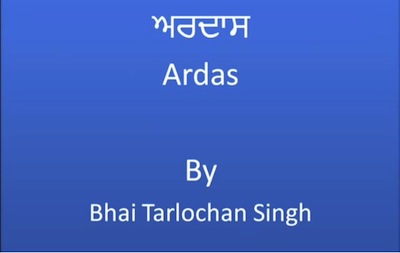
Ardas
The Ardās is done before performing or after undertaking any significant task; after reciting the morning and evening Banis, at the completion of a service like the Paath, kirtan or any other religious program. Ardās may also be said before and after eating. The prayer is a supplication to God to support and help the devotee with whatever he or she is about to undertake or has done.
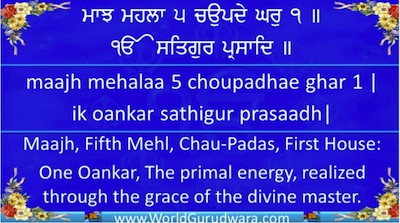
Shabad Hazare
Guru Gobind Singh ji describes his philosophy and inherent beliefs of Dharam and its perception. Speaking against mindless rituals, and beliefs in many Gods (as opposed to belief in the One), the ballads narrate the greatness of the Almighty.
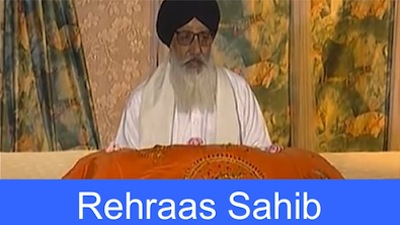
Rehras Sahib
Rehraas Sahib is collection of hymns of five different Gurus. The Rehras as recorded in the Guru Granth Sahib contains hymns of only Guru Nanakji, Guru Amardas ji, Guru Ramdas ji and Guru Arjan Dev ji. The compositions of Guru Gobind Singh ji were added in Rehras Sahib.
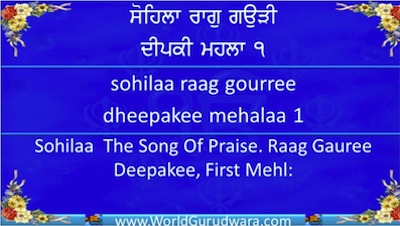
Kirtan Sohila
Three Gurus — Guru Nanak, Guru Ram Das and Guru Arjan – contributed five shabads on the pain of separation and celebrating the bliss of union. The first three Shabads were uttered by Guru Nanak, the fourth by Guru Ram Das and the fifth by Guru Arjan Dev. This is the night prayer said by all Sikhs before sleeping.
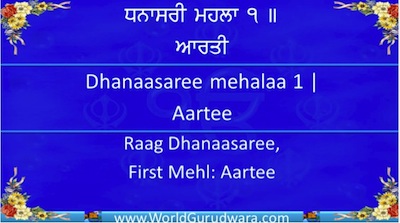
Aarti
This is a compiled Bani from Guru Granth Sahib Ji and Dasam Granth. Various parts are composed by Guru Nanak Dev Ji, Bhagat Kabir ji, Bhagat RaviDass Ji and Guru Gobind Singh Ji.
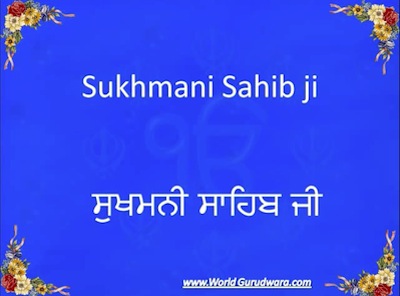
Sukhmani Sahib
Sukhmani literally means Peace in your mind. this Bani is believed to bring peace to one’s mind and compoundly peace to the world. This set of 192 hymns were compiled by the fifth Sikh Guru, Guru Arjan Dev Ji. This is divided into 24 sections in the Sri Guru Granth Sahib ji on page 262. Each section, which is called an Ashtpadi(asht means 8), consists of 8 hymns per Ashtpadi.

Asa Di Var
It is a collection of 24 pauris or stanzas by Guru Nanak Dev ji on page 462-475 in Sri Guru Granth Sahib ji. Guru Arjan Dev ji also added a few Sloks of Guru Angad Dev ji. These Sloks are tied together in a way that they relate to the same theme as highlighted in the pauri. Asa Di Var also contains a few shabads recited by Guru Ram Das ji.

Ramkali Ki Vaar
Ramkali Ki Var, also known as Tikke di Var, is the joint composition of the Balvand and Satta. The Var comprises of eight pauns or stanzas, of unequal length, varying from seven to twenty-one lines.

Basant Ki Var
Basant Ki Var, by Guru Arjan Dev, is the shortest of the twentytwo vars. Vars are heroic ballads included in the Guru Granth Sahib. Basant, is the Punjabi word for spring from which the musical measure the Var derives its title. Like Malhar (the raga of the rainy season) the Basant Ki Var is an ancient seasonal raga – the raga of springtime.
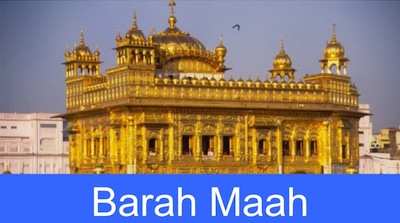
Barah Maah Maajh
It is a form of folk poetry in which the emotions and yearnings of the human heart are expressed in terms of the changing moods of Nature over the twelve months of the year. Guru Nanak Dev ji’s Barah Maha is the oldest composition in this genre transforming into spirituality. This is followed by Guru Arjan’s Barah Maha.
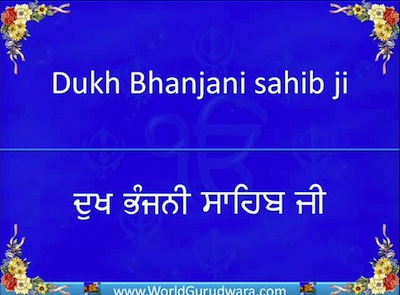
Dukh Bhanjani Sahib
It begins with the shabad “Dukh bhanjan tera naam meaning “The Destroyer of Suffering is Thy Name”. It is a compilation of scripture which includes many shabads written by fifth Guru Arjun Dev ji during the illness and healing of his young son sixth Guru Hargobind ji.
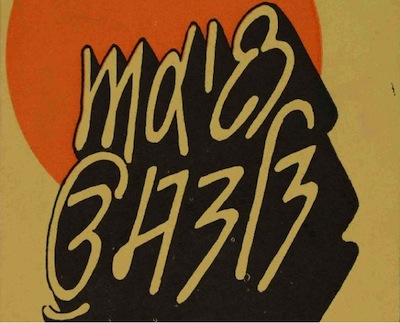
Akal Ustat
It is the second Bani in the Dasam Granth. This text spans from page 33 to page 94. It is composed of 271 verses, and is largely devotional in nature. ‘Akal’ translates to ‘Immortal’ and ‘Ustat’ translates to ‘praise of’. The text describes the many forms of the Almighty in nature, and how mankind perceives this great entity.
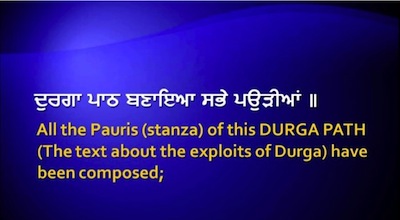
Chandi Ki Var
Chandi di Var also known as Var Sri Bhagauti Ji is a composition included in the 5th chapter of Dasam Granth. It is based on an episode from the Sanskrit work Markandeya Purana, and describes the conflict between the Gods and the Demons. The first part of the Var is known as the “Ardas”, the opening Section of Sikh prayer which invokes the names of the Gurus.